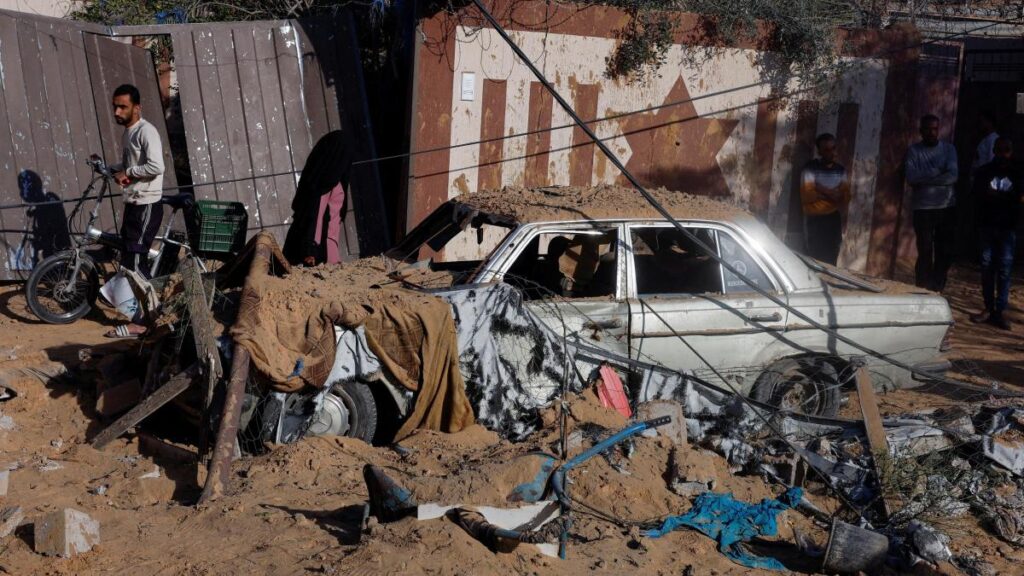In a recent escalation of violence, Israeli airstrikes in southern Gaza have reportedly resulted in the deaths of at least 38 Palestinians, including nine children from a single family in Khan Younis. The Hamas-controlled health ministry announced these figures, revealing a grim picture of the ongoing conflict as Israeli forces conducted operations based on intelligence suggesting the presence of terrorists in the area. In a concerning incident, Israeli troops reportedly stormed Kamal Adwan hospital in northern Gaza, demanding that patients and medical personnel evacuate. The Israeli military has stated it is working diligently against Hamas, claiming to have dismantled several terrorist infrastructures and eliminated numerous terrorists in the region.
Eyewitness accounts highlight the tragic impact of the strikes, particularly in Khan Younis, where residential buildings were targeted in the early hours of the morning. One survivor recounted the harrowing experience of losing her family members, affirming that the strike caused significant civilian casualties, exacerbating the humanitarian crisis. Gaza’s Civil Defence agency, while responding to the aftermath of the bombings, shared videos and photographs revealing the grim process of recovering young victims’ remains from the rubble. The health ministry condemned these incidents as “massacres,” framing the offensive as part of a larger pattern of state violence against civilians.
The raid on Kamal Adwan hospital has raised international alarm, particularly as it housed a significant number of patients and displaced civilians seeking shelter. The Israeli military’s ongoing operations prompted widespread censure from humanitarian organizations, including the World Health Organization (WHO), which highlighted the deteriorating conditions within the hospital and the urgent need for medical supplies. Reports indicated that, while some coordination had occurred to evacuate patients, the presence of Israeli tanks around the facility has created an environment of fear and insecurity for both medical staff and patients. The WHO has stated that it lost contact with its personnel at the hospital, underscoring the chaos engulfing medical services in the area.
Jordan’s Foreign Minister Ayman Safadi has escalated the rhetoric surrounding the situation, accusing Israel of engaging in “ethnic cleansing” in northern Gaza. He called for increased pressure from the United States on Israel due to the massive displacement of civilians occurring in the area. The exodus has left over 60,000 Palestinians homeless, with many displaced from their homes, which may reflect a systematic plan to clear areas of civilians as hinted by widespread local belief. The ramifications of these displacements could have lasting effects on the dynamics of the Israel-Palestine conflict, especially against the backdrop of a potential humanitarian catastrophe.
With tensions running high, Safadi also warned that the region was on the brink of a larger conflict, urging immediate and decisive action from global leaders, particularly the U.S., which plays a significant role in the broader geopolitical landscape in the Middle East. He expressed frustration that each meeting with U.S. Secretary of State Antony Blinken revealed worsening conditions, suggesting a dissonance in diplomatic efforts versus the ground realities facing Palestinian civilians. The urgent calls for comprehensive solutions underscore the wider implications of the ongoing conflict, extending beyond Gaza into regional stability.
Meanwhile, U.S. diplomatic efforts are underway, with Blinken expressing concern for both Gaza’s humanitarian situation and the wider implications of the conflict. At the same time, Israel is reportedly sending high-level officials to negotiate over ceasefire arrangements and hostage releases, amidst indications that Hamas’s conditions for negotiations, centered around the withdrawal of Israeli troops, remain unchanged. The complexity of the situation is compounded by the historical animosities and recent developments following Hamas’s attacks on Israel, which ignited the current wave of retaliation and strikes resulting in significant casualties on both sides.
As the situation evolves, the toll on Palestinian civilians continues to escalate, with the Hamas-run health ministry reporting over 42,840 deaths since the conflict’s resurgence. The ongoing violence, characterized by airstrikes and invasions, raises profound humanitarian concerns, making it imperative for international stakeholders to navigate the choppy waters of diplomacy and humanitarian response amid an increasingly volatile scenario in Gaza and the broader region.

